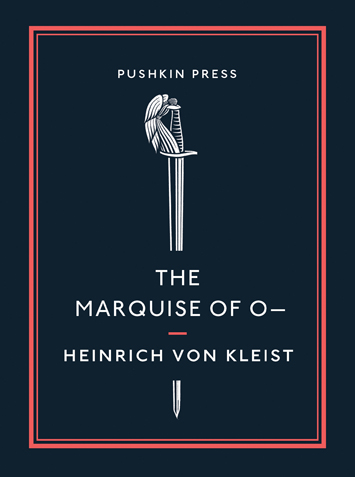The Marquise of O– by Heinrich von Kleist – Review

By Barney Bardsley
Pushkin Press, at just over twenty years old now, is one of our livelier publishers of new contemporary adult and children’s writing from around the world. But they also produce high quality editions of twentieth century international classics. Their championing of middle European and Russian authors, such as Stefan Zweig, Teffi, and Antal Szerb, has meant that these delightful, highly literary authors have reached a much wider readership in the UK than might otherwise be the case.
One of their lists is the Pushkin Collection – pocket sized paperbacks of European classics. A new addition to the Collection is Heinrich von Kleist’s feverish novella, The Marquise of O–. First published in 1808, this story (based on a true account) hinges on a single, startling event, revealed in the book’s opening sentences.
An Italian noblewoman and widow – the eponymous Marquise – places a notice in a newspaper, to announce that she is pregnant, but that she has no idea who the father is. If this man were to make himself known, she says, then she would have no hesitation in marrying him, and thus salvaging the honour of her entire family.
 What then unfolds is a dizzying and breathless account of a series of strange events, all subtly skewed by the viewpoints of the various protagonists. We learn that, prior to her newspaper declaration, the Marquise was attacked by a group of soldiers during a military siege; that she was subsequently saved by a Russian officer; and that she has since been pursued by this same officer, who – blissfully ignorant of her predicament – has fallen head over heels in love with her.
What then unfolds is a dizzying and breathless account of a series of strange events, all subtly skewed by the viewpoints of the various protagonists. We learn that, prior to her newspaper declaration, the Marquise was attacked by a group of soldiers during a military siege; that she was subsequently saved by a Russian officer; and that she has since been pursued by this same officer, who – blissfully ignorant of her predicament – has fallen head over heels in love with her.
“Disturbingly modern”
Who on earth can the father be? The story twists and turns to suggest many different variations of the truth – including, shockingly, an overt and unforgettable hint of father-daughter incest, in the closing pages of the story.
Despite a chocolate box finale, Kleist’s objective throughout his narrative, is to reveal how slippery a concept “the truth” is. Whose version of events are we to believe, if even the central character has no clear idea what has happened to her? Life, he suggests, is unreliable and uncertain: reality itself slips and slides away before our very eyes.
Kleist was much influenced by the relativist philosophy of Kant – and came to believe that there is no such thing at all as objective truth. Franz Kafka – who was a great admirer of Kleist, and of this story in particular – would later expand on this troubling and destabilising notion, in all his great works.
The Marquise of O– may sound like a fable from a very different era, with its archaic references to a long extinct foreign nobility, and a far-off war (the fight against Napoleon in Northern Italy at the end of the eighteenth century), yet in our own “post truth” political era, Kleist’s writing actually feels disturbingly modern.
Translator Nicholas Jacobs has done a fine job, too, in keeping a balance between the use of necessarily arcane constructions, suited to the era in which they were written, and a contemporary boldness and clarity of expression, thus ensuring that the Marquise leaves her mark on the modern reader’s mind.
‘The Marquise of O–’ by Heinrich von Kleist, translated by Nicholas Jacobs is published by Pushkin Press, £12 paperback









